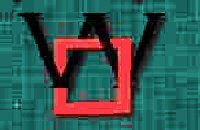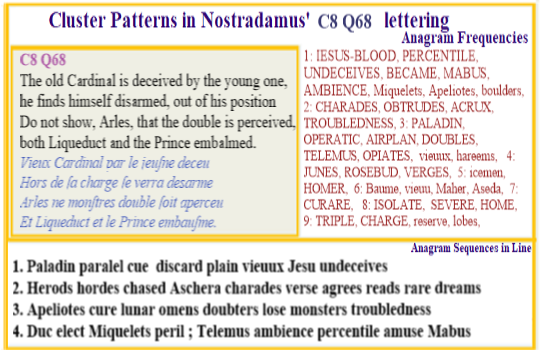 Analyses of all verses
Analyses of all verses
|
 Web Site
Web Site |
 All
Sefirots All
Sefirots |
Nostradamus C8 Q68: The odyssey of a warrior fighting the wind Gods.
Copyright: Allan Webber, December 2015
 This
verse has a religious conspiracy setting in its text and an obscure name
(Liqueduct) while the anagrams hold diverse names, notably
Mabus, Paladin, Homer, Apeliotes,
Miquelets and
Ashera.Together they offer alternate sources
for Nostradamus' tales, to that relied on by religion.
This
verse has a religious conspiracy setting in its text and an obscure name
(Liqueduct) while the anagrams hold diverse names, notably
Mabus, Paladin, Homer, Apeliotes,
Miquelets and
Ashera.Together they offer alternate sources
for Nostradamus' tales, to that relied on by religion.
This alternate source then beomes a lexicon for one religious stream of Nostradamus verses,
In France and Italy the word 'charade' still refers to this kind of written linguistic riddle. Much of Homer's work is aptly described as presenting linguistic clues to many riddles.
Now from the anagrams that appear I am confident that part of the riddle of this verse lies in the names for the Anemoi (see below) because the name of one appears in the anagrams, there are also anagrammatic references to horses that are consistent with the ancient tales.
In addition the lines of text are made pertinent by the strategic reference to the old Cardinal (points of compass) which are the main Wind Gods and they are deceived by the young one (lesser Wind God such as Apeliotes.
Anagrams from which the framework for this verse can come include:
Extra Info:
The Anemoi were the Greek wind Gods with the four main names associated with the Cardinal points and the four lesser names indicating the middle directions. Apeliotes ( le ſoit ape) was the south-east wind and Boreas, the name most associated with horses, was the cold North wind.
They were sometimes represented as mere gusts of wind, at other times were personified as winged men, and at still other times were depicted as horses kept in the stables of the storm god Aeolus, who provided Odysseus with the Anemoi in the Odyssey.
Boreas was closely associated with horses. He was said to have fathered twelve colts after taking the form of a stallion.
Apeliotes, sometimes known to the Romans as Apeliotus, was the Greek deity of the southeast wind. As this wind was thought to cause a refreshing rain particularly beneficial to farmers, he is often depicted wearing gumboots and carrying fruit, draped in a light cloth concealing some flowers or grain.
It is important to note that Homer's Odysseus is a reference point for the above elements and so when we note that Telemus ( uſme Et L) is another anagrammatic name in the verse then we have the basis to see that Nostradamus is himself using a charade, a word riddle using older word riddles to bring out the framework of a futuristic tale.
Telemus (Gk:Τήλεμος Telemos) was a figure of Greek mythology, a prophet, son of Eurymus. Telemus warned the Cyclops Polyphemus that he would lose his sight to a man named Odysseus
So our futuristic tale is framed around the nature of winds and a prophet whose stories of a coming warrior forewarns those who will suffer loss by his hand.
There are two other names that act aspossible reference points but there is no immediate link to that of the Homeric tales.
The paladins, sometimes known as theTwelve Peers, were the foremost warriors of Charlemagne's court, according to the literary cycle known as the Matter of France.[1] They first appear in the early chansons de geste such as The Song of Roland, where they represent Christian valor against the Saracen hordes inside Europe.
The term Miquelets ( ſme Et Lique) was used for many unconnected groups of Catalans in Spain who took up arms in many wars, as well as in banditry.
They were active in Catalan secessionist revolt of 1640 and in the Spanish Wars of Succession (1701-1740) and the Siege of Gerona in 1809.
This verse is the only one that contains an anagram of Mabus ( bauſm) but it also occurs once in the text of one of the more famous Prophecies (C2 Q62).
Mabus will then soon die, there will come
Of people and beasts a horrible rout
Then suddenly one will see vengeance,
Hundred, hand, thirst, hunger when the comet will come.
Key Ideas:
Jesus-blood, undeceives, Miquelets, percentile,
Apeliotes, ambience, became, doubters, troubledness,
Homer, operatic,
charades, view, Mabus, Paladin, doubles, Telemus, rosebud, opiates,
verges, icemen, isolate, curare, severe, charge, triple, Junes, lobes,
acrid, reserve,
Herods, dreams, amuse, Aschera, readers, monsters,
hordes, ensued.